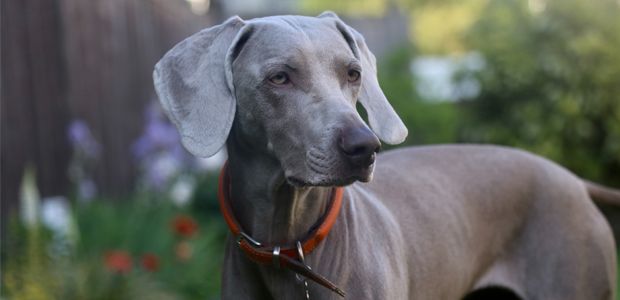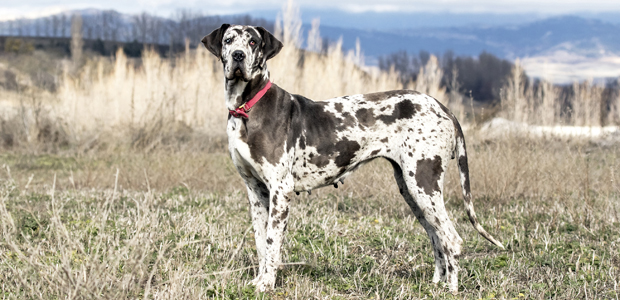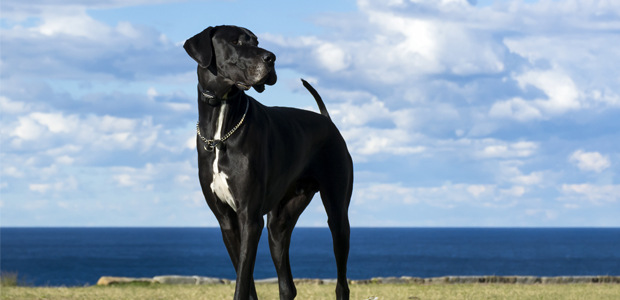The Great Dane: is it the right breed for you?
First Published: 23/02/2022
Last Updated: 31/10/2023
Great Danes are loyal, lively and loving dogs, earning the nickname of ‘gentle giants’ because of their sweet nature.
They are recognised as the largest dog breed in the world. They have plenty of energy and love to be outdoors, so make perfect companions for owners with active lifestyles.
Great Danes were originally bred as hunting dogs and gained popularity due to their aptitude for guarding and affectionate personalities.
Great Dane summary:
- Giant dogs with a docile nature
- Coat can be black, blue, brindle, fawn and harlequin
- Great Dane life expectancy = 8 - 10 years
- Average size = 70 - 77 cm
- Average weight = 45 - 55 kg
- Estimated monthly cost = High
- Exercise needs = High
- Attention needs = Medium
- Sociability = Medium
Please note: A dog’s exercise, training/stimulation and grooming requirements can depend on several factors such as age and health. The same goes for ongoing costs of ownership. For advice on one specific dog, we always advise chatting with a vet.
How much exercise does a Great Dane need?
Strong and energetic, Great Danes need a lot of exercise to keep them in good shape. They can become bored if they don’t get enough physical & mental stimulation. They’ll require at least 2 hours of exercise a day to ensure that their exercise needs are met.
If you and your family are keen on outdoor adventures and are looking for a four-legged friend to come along, a Great Dane could be the perfect companion for you. They’ll happily join you on rambling walks.
To keep them happy and healthy, take them to a secure environment where they can run off-lead, with lots of interesting things to see and sniff.
As with all breeds, be careful not to over-exercise them whilst they are still growing, as this can have long term effects on their joints.
As well as outdoor activities, Great Danes need to stay mentally stimulated with training and puzzle games.
Great Dane dietary requirements
Your Great Dane will need a balanced diet rich in nutrients, vitamins, and minerals. It’s best to feed them complete dog food specially formulated for large breeds to ensure that they are getting the right amount of vitamins and nutrients.
Growing pups may prefer 3-4 smaller servings during the day, rather than two larger meals. This can be reduced to two meals a day as your dog gets older.
The recommended portion size will depend on your individual dog. You’ll need to take into account their activity level, age and metabolism. To avoid weight gain, make sure your Great Dane has a healthy and balanced diet and gets plenty of exercise.
Training: how to train a Great Dane
Great Danes are intelligent dogs who respond well to training because of their eagerness to please their owners.
Because of their size and strength, it’s important they are trained from an early age with plenty of positive reinforcement to stop them from pulling on the lead or jumping up.
With a long history of guarding, Great Danes can be wary of visitors and other dogs. Their deep bark can cause some people to panic or become afraid, so it’s vital that they are well socialised as puppies.
As is the case with all breeds, Great Danes will start to approach new experiences with caution when they are around 12 weeks old. Therefore, it’s really important for their development that they experience as many different situations as possible.

Grooming: do Great Danes shed?
Great Danes are fairly low maintenance when it comes to grooming. Thanks to their short coat, a quick brush once a week will suffice. You should only need to bathe your Great Dane when they get muddy.
Although their coats won’t take much upkeep, they are known to be droolers. Regular wiping will keep their face and mouth clean and healthy, just keep an eye out for vigorous head shakes, which can result in a drenching.
Complete your Great Dane’s grooming routine with regular tooth brushing, nail clips and ear checks.
Cost of owning a Great Dane
When considering the lifetime cost of owning a Great Dane, remember to take into account the following costs:
- Great Dane food and dietery needs
- Veterinary care
- Pet insurance
- Kennels or dog sitters
- Great Dane grooming costs
- Toys and equipment
- Preventative healthcare
As a rough guide, allow between £100 and £150 a month to cover the ongoing costs of owning a Great Dane. Our vets have drawn up this handy guide to save dog owners money.
Are Great Danes prone to any health problems?
Great Danes are prone to certain health problems, just like all breeds. This doesn’t mean your dog is guaranteed to contract any particular disease – it’s just something to bear in mind.
To keep your Great Dane as healthy as possible, monitor them closely and attend routine 6-month health checks with your vet. This will allow the vet to give your dog a thorough check-up and to pick up on minor (often symptomless) conditions before they have a chance to escalate into something worse.
Possible health complications for Great Danes include:
- Canine dental issues and gum disease
- Infections
- Canine obesity and weight problems
- Allergies in dogs (including fleas, food and pollen)
- Hip dysplasia
- Epilepsy
- Cancers
- Bone disorders
- Gastric Dilatation Volvulus (GDV): a condition that causes the stomach to twist.
Before welcoming a new dog into your household, make sure you’re able to cover the costs of any routine or emergency medical treatment they may need. Pet insurance will help massively with this. Why not ask your vet about their recommended pet insurance policy?

Great Dane temperament, socialising and ideal home environment
Great Danes are large, active dogs who need plenty of space to roam. A house with a large garden for them to explore is essential and they are not suited to apartment living.
Because of their size, they might not make the best pet if you have young children, because of the risk of knocking them over. They are better suited to households with adults and older children.
Their large, strong tails are prone to knocking over objects, so be careful to put trinkets, knick-knacks or any valuables high up and out of the tail-wag zone. As with all breeds, it’s recommended that children are supervised when playing with dogs.
Whilst they are still young and receptive, it's a good idea to introduce your Great Dane to other dogs, people and livestock as well as car travel and unfamiliar noises, such as traffic.
Great Danes love to spend time with people and love nothing more than a good pat on the head. Affectionate dogs that form strong bonds with their owners, they can be prone to developing separation anxiety.
It’s good practice to leave them on their own for small periods during training so that they can get used to being by themselves.
Are Great Danes suitable for first time owners?
Great Danes may not be the easiest companion, especially if you’re a first-time pet owner. They’re intelligent and large dogs that can quickly become a handful if they’re not properly stimulated and socialised.
They need lots of attention and exercise, so if you’re out of the house for most of the day, then they might not be the most suitable breed for you.
That said, if you lead an active outdoor lifestyle and are able to give them the time, space and attention they need, there’s no reason for a Great Dane not to be your ideal pet. If you have done your research beforehand, owning a Great Dane can be an enjoyable and rewarding experience.
Need more info?
For more info on finding the best dog breed for you and your lifestyle, have a chat with your vet. Find your nearest vet using our Find a Vet page.

